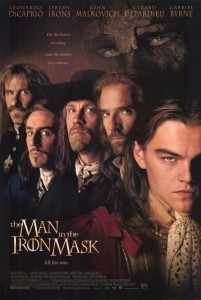MOVIE: The Man in the Iron Mask – Defending Your Honor
Honor.
It’s a word that is not used much in modern society. The concept itself has been somewhat forgotten, in the wake of self-indulgent leaders, corrupt politicians and superficial celebrities. The concept of honor – admiring someone for how well they adhere to a set of moral principles – is hard to grasp. Because it is often hard to find examples of it. Our society shines a spotlight on the rich and powerful, and we view them and long to attain the material wealth and influence they have obtained.
But we don’t necessarily want to become like them. That is, to think and act the way they do.
By focusing on what they have, rather than their inner character, 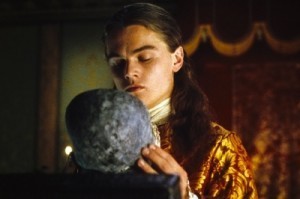 we become jealous and greedy for things that don’t really last over time, the way a good reputation will.
we become jealous and greedy for things that don’t really last over time, the way a good reputation will.
In the 1998 film, “The Man in the Iron Mask”, honor is displayed through the legendary musketeers, remembered for their bravery and self-sacrifice in protecting their king and country. But these heroes have long since retired, all except for D’Artagnan (Gabriel Byrne), now captain of the king’s musketeers. He insists on maintaining his duty to protect the new king, Louis XIV (Leonardo DiCaprio), in spite of the fact that Louis is a cruel, self-serving dictator who is forcing the country into poverty while he himself lives in luxury and beds a long procession of women. 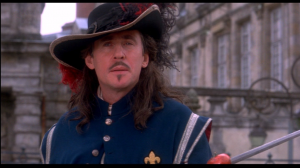 D’Artagnan hopes Louis will mature and learn to govern his people wisely, instead of continuing to act like a selfish child.
D’Artagnan hopes Louis will mature and learn to govern his people wisely, instead of continuing to act like a selfish child.
When Louis privately orders another former musketeer, Aramis (Jeremy Irons), to kill the general of the Jesuits threatening to overthrow him, Aramis agrees to do so. However, he cannot, since he himself is the Jesuit general. Instead, he arranges a secret meeting with the other musketeers, Porthos (Gérard Depardieu), Athos (John Malkovich), and D’Artagnan. 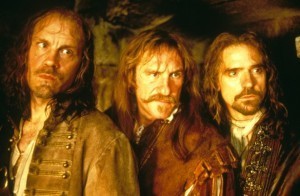 Aramis suggests they join together to overthrow their corrupt king, to free France of his tyranny. D’Artagnan refuses to partner with them in their plot, yet leaves the meeting before hearing any more. It would be right for him to expose their plot to Louis and have them all arrested. But he has no more desire to arrest his friends than to betray his king. He cannot fault them for wanting to protect the country, but he urges them to be patient and give the king more opportunity to change his ways.
Aramis suggests they join together to overthrow their corrupt king, to free France of his tyranny. D’Artagnan refuses to partner with them in their plot, yet leaves the meeting before hearing any more. It would be right for him to expose their plot to Louis and have them all arrested. But he has no more desire to arrest his friends than to betray his king. He cannot fault them for wanting to protect the country, but he urges them to be patient and give the king more opportunity to change his ways.
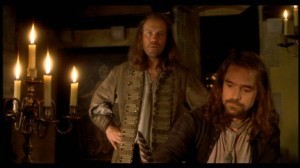 After D’Artagnan leaves, Aramis reveals that Louis has a twin brother, Philippe, who was kept hidden in order to prevent a war over the kingdom. Louis learned of his twin years ago and ordered Aramis himself to arrest Philippe and lock him in an iron mask to hide his identity before taking him to the Bastille prison. To this day, Aramis remains ashamed of agreeing to let an innocent young man suffer. But since Philippe is also of royal blood, Aramis has determined the only way to set things right is to replace Louis with Philippe.
After D’Artagnan leaves, Aramis reveals that Louis has a twin brother, Philippe, who was kept hidden in order to prevent a war over the kingdom. Louis learned of his twin years ago and ordered Aramis himself to arrest Philippe and lock him in an iron mask to hide his identity before taking him to the Bastille prison. To this day, Aramis remains ashamed of agreeing to let an innocent young man suffer. But since Philippe is also of royal blood, Aramis has determined the only way to set things right is to replace Louis with Philippe.
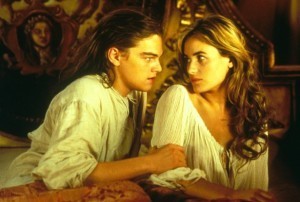 After some debate over the strength of Aramis’ plan, Athos and Porthos agree they have no better option. Athos wants revenge on the king for forcing his son, Raoul (Peter Sarsgaard), to be killed in battle by ordering him back into battle after his term of service ended and moving him to the front lines of battle without cause. The real reason was that Louis had taken an interest in Christine (Judith Godréche), Raoul’s fiancée. After having Raoul killed, Louis seduced Christine and made her his mistress.
After some debate over the strength of Aramis’ plan, Athos and Porthos agree they have no better option. Athos wants revenge on the king for forcing his son, Raoul (Peter Sarsgaard), to be killed in battle by ordering him back into battle after his term of service ended and moving him to the front lines of battle without cause. The real reason was that Louis had taken an interest in Christine (Judith Godréche), Raoul’s fiancée. After having Raoul killed, Louis seduced Christine and made her his mistress.
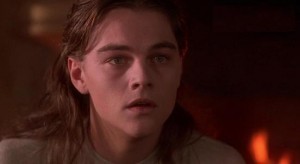 After the musketeers free Philippe from prison and his mask, they explain to him who he is. Having been raised in a common house and then being sentenced to the dungeon for years, Philippe finds it hard to grasp that he is the king’s twin. He also wonders whether he can sacrifice a simple common life, with all its ordinary pleasures, to live in a palace and be responsible for the entire country. He understands why the musketeers want him to do it, but he’s not sure it’s what he wants to do with his own life.
After the musketeers free Philippe from prison and his mask, they explain to him who he is. Having been raised in a common house and then being sentenced to the dungeon for years, Philippe finds it hard to grasp that he is the king’s twin. He also wonders whether he can sacrifice a simple common life, with all its ordinary pleasures, to live in a palace and be responsible for the entire country. He understands why the musketeers want him to do it, but he’s not sure it’s what he wants to do with his own life.
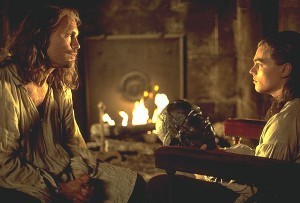 When he tells Athos, who has agreed to mentor him in his portrayal of the king, that he knows Athos wants to pursue the plan in order to avenge his son, Athos tells him that’s not the true reason. “Once, I – once, all of us – believed in serving something greater than ourselves,” Athos tells him. “Aramis had his faith, Porthos his lust for life, D’Artagnan his devotion. And I had Raoul. But we all had a common dream. That one day we would finally be able to serve a king who was worthy of the throne. It is what we dreamt, what we bled for, and what we have waited a lifetime to see. I taught Raoul to believe in that dream, and now my son is dead. And now I want to know if my son’s life was in vain. And the only person who can answer that is you.”
When he tells Athos, who has agreed to mentor him in his portrayal of the king, that he knows Athos wants to pursue the plan in order to avenge his son, Athos tells him that’s not the true reason. “Once, I – once, all of us – believed in serving something greater than ourselves,” Athos tells him. “Aramis had his faith, Porthos his lust for life, D’Artagnan his devotion. And I had Raoul. But we all had a common dream. That one day we would finally be able to serve a king who was worthy of the throne. It is what we dreamt, what we bled for, and what we have waited a lifetime to see. I taught Raoul to believe in that dream, and now my son is dead. And now I want to know if my son’s life was in vain. And the only person who can answer that is you.”
 Philippe considers this, and ultimately decides to proceed with their plan. Athos teaches him how to conduct himself as royalty, to show no concern for other people and to stop using polite manners, since everyone else is expected to defer to him instead. He continues to remind Philippe that, especially in the case of King Louis, he must think only of himself.
Philippe considers this, and ultimately decides to proceed with their plan. Athos teaches him how to conduct himself as royalty, to show no concern for other people and to stop using polite manners, since everyone else is expected to defer to him instead. He continues to remind Philippe that, especially in the case of King Louis, he must think only of himself.
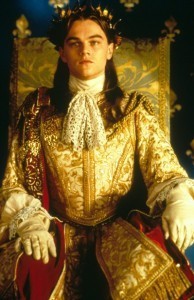 The musketeers steal into the palace during a royal ball and kidnap the king, sending Philippe in his place. Philippe accidentally gives himself away when one lady stumbles to the palace floor. Philippe hurries down from his throne to help her up, an act which shocks and confuses everyone at the party. Then Christine storms into the court and presents evidence that Louis had her fiancé, Raoul, murdered, and Philippe – acting as the king – promises to make amends to her, rather than having her executed, as Louis would have done. D’Artagnan senses something is wrong and urges “the king” to accompany him outside. He and his guards discover the musketeers escaping with King Louis. D’Artagnan recovers him, and the guards capture Philippe while the musketeers escape, forced to leave Philippe behind.
The musketeers steal into the palace during a royal ball and kidnap the king, sending Philippe in his place. Philippe accidentally gives himself away when one lady stumbles to the palace floor. Philippe hurries down from his throne to help her up, an act which shocks and confuses everyone at the party. Then Christine storms into the court and presents evidence that Louis had her fiancé, Raoul, murdered, and Philippe – acting as the king – promises to make amends to her, rather than having her executed, as Louis would have done. D’Artagnan senses something is wrong and urges “the king” to accompany him outside. He and his guards discover the musketeers escaping with King Louis. D’Artagnan recovers him, and the guards capture Philippe while the musketeers escape, forced to leave Philippe behind.
D’Artagnan then learns the truth that Philippe is Louis’ own brother, as Louis orders him to be returned to prison and to the iron mask. 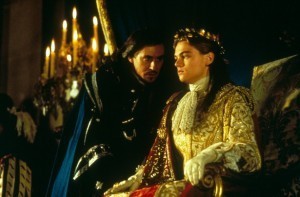 D’Artagnan then joins the musketeers in an effort to free Philippe from prison.
D’Artagnan then joins the musketeers in an effort to free Philippe from prison.
Louis and his guards corner D’Artagnan and the others at the Bastille prison, giving them no escape. Philippe offers to surrender himself so the musketeers can be spared, but D’Artagnan refuses. He confesses to a secret affair with Queen Anne (Anne Parillaud), explaining that he is the father of both Louis and Philippe, and he can’t bear to let either of them die. He had served Louis all these years as a father, not merely as a soldier. Philippe recognizes that all this time, D’Artagnan himself was the one forced to wear a mask.
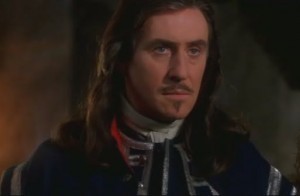 They all agree to face the kings’ guards together, and charge straight into the volley of gunfire. The guards are awestruck by the musketeers’ charge, and Lieutenant Andre (Edward Atterton) mutters, “Magnificent valor.” King Louis orders his men to fire. The guards are reluctant to shoot the legendary musketeers that they have always admired, and close their eyes as they pull their triggers. When the smoke clears, they discover that nearly every shot missed, and the musketeers and Philippe are still alive, walking toward them. The guards refuse to shoot at their heroes again.
They all agree to face the kings’ guards together, and charge straight into the volley of gunfire. The guards are awestruck by the musketeers’ charge, and Lieutenant Andre (Edward Atterton) mutters, “Magnificent valor.” King Louis orders his men to fire. The guards are reluctant to shoot the legendary musketeers that they have always admired, and close their eyes as they pull their triggers. When the smoke clears, they discover that nearly every shot missed, and the musketeers and Philippe are still alive, walking toward them. The guards refuse to shoot at their heroes again.
After the guards learn that Philippe is the king’s brother, Louis tries to stab Philippe. D’Artagnan steps in front of him, so that Louis kills him instead. 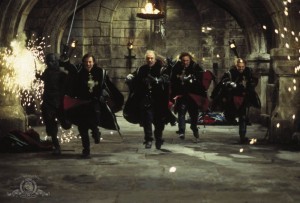 At this, Lieutenant Andre arrests the king, saying, “All I ever wanted to be … was him.”
At this, Lieutenant Andre arrests the king, saying, “All I ever wanted to be … was him.”
Lieutenant Andre helps the musketeers to place Louis in the iron mask and replace him with Philippe. Being an honorable man, Philippe later grants a royal pardon to Louis and allows him to live out his days in a country house, away from the palace, while Philippe – posing as the king – restores order and peace to the country, thereafter remembered asFrance’s greatest ruler.
Honor is sometimes difficult to pinpoint. One man’s honorable actions – such as protecting a corrupt king – might seem dishonorable to someone else – like the musketeers who sought to overthrow him. Yet each person must determine to follow a set of guiding principles that benefit others, often at their own expense. Defending your honor might mean losing your reputation, your friends, your possessions, or even your life.
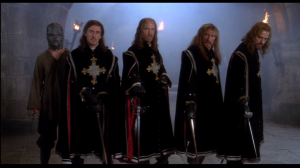 But if it serves others, rather than your own personal ambitions or desires, it’s worth defending.
But if it serves others, rather than your own personal ambitions or desires, it’s worth defending.
Those people who act with honor are the ones who inspire us. Their example of self-sacrifice, courage and dedication lead us to become more like them: to become people of honor ourselves.
But honor is a compliment, after others recognize the way we have lived our lives.
The actions must always come first.
Find more reviews of “The Man in the Iron Mask” at amazon.com!
Packing Action
- Randall Allen Dunn's profile
- 56 followers


